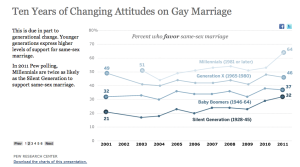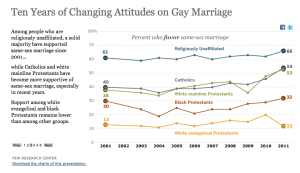There is a interesting set up graphs from the Pew Research group on the peoples perception/view of gay marriage categorized by groupings.
Some quick thoughts:
- Not surprising that an overall divide of opinion is about half & half (graph 1)
- Not surprised to see that the youngest generations are more in favor of a gay marriage (graph 2). Percentages have exceeded a majority which is interesting and also lends to a huge divide in values between a church’s viewpoint (graph 3).
- Not surprising is the breakdown of the Christian faith categories. Though I might say that such a high differential between the Catholic and Mainline Protestant views & the Religiously Unaffiliated. Again, a huge values divide there (graph 3)
- Was kinda surprised a more moderate voice in the Republican party didn’t bring the political viewpoint a little bit closer to the Democratic / Independent view (which are almost identical). Though a difference is expected, it was a huge divide there and is probably that hill many republican conservatives are willing to die, or live/campaign on (graph 4).
- Graph 5 is probably right where I’d expect our culture. Conservatives & Liberals are riding their lines and are quite set in those. The Moderates might be like me, you’d favor it, but you are not sure that it is in the whole country’s interest to force it so you’d opt for a conservative/cautious approach. Some then are probably just good either way.
One thing was plugging at my thoughts reading this. An institution, like my church tribe, cannot survive with one or two generations of people apathy towards it. There needs to be some reconciliation that would bring some relational & passionate connection towards the Gen X’ers & Millennials, not to mention the generation after Millennials who are probably going to be more affirming, within the church so that it can survive a values divide. Tough call there as a theology could be debated on either side and the long tradition of the church leans against. Changing just because culture is shifting isn’t the most divine way to change, but it has done so for less than divine reasons before.. Tough call, but a call that needs to be made sometime soon or continue a slow death


